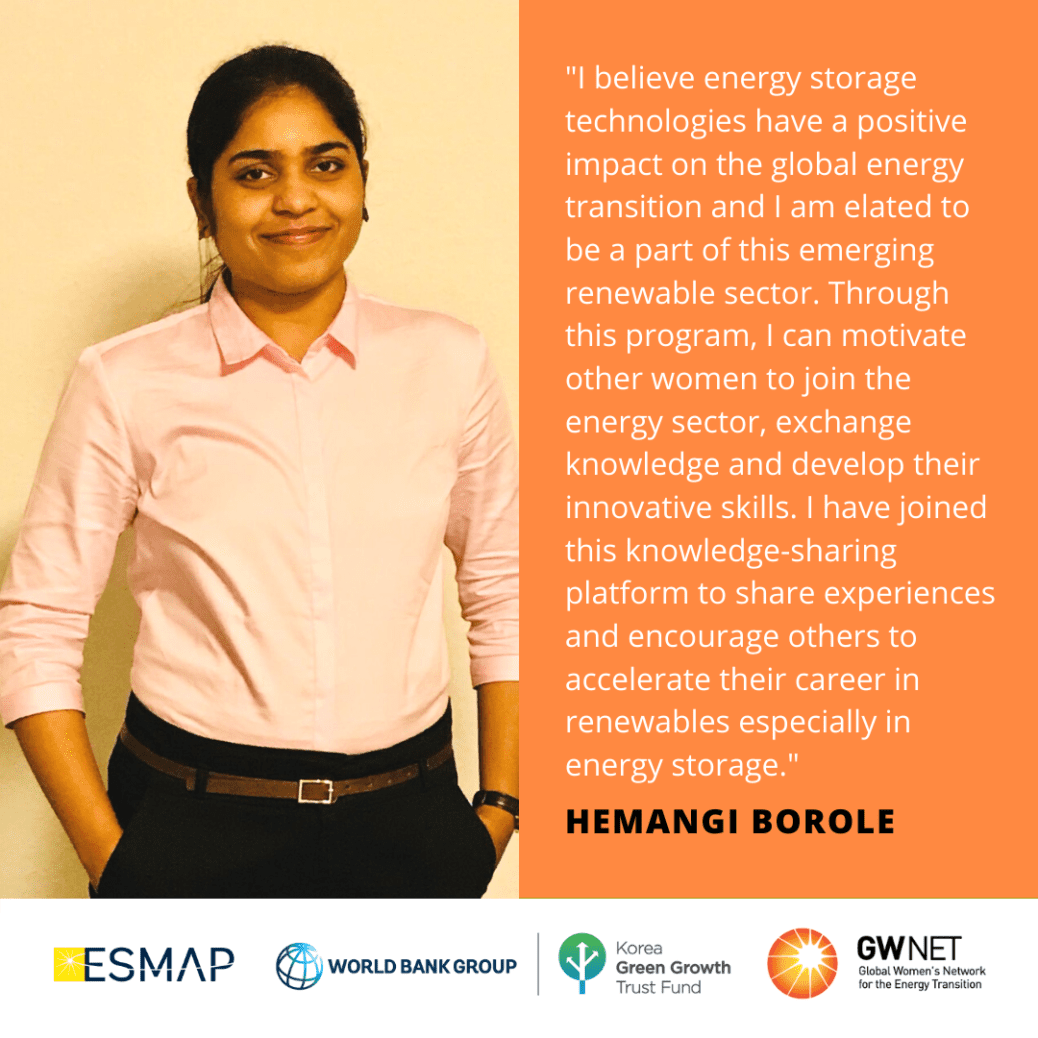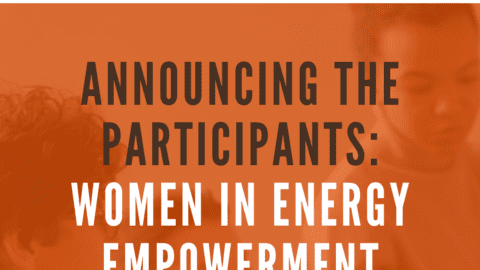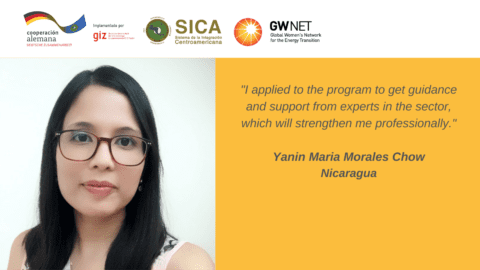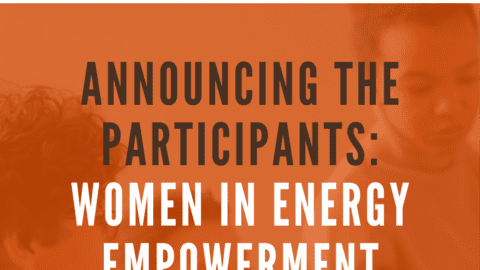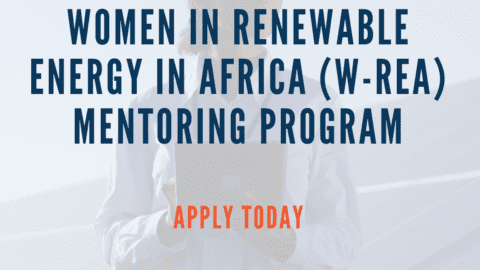The Women in Energy Storage Mentoring Programme sat down with Hemangi Borole, one of this year’s mentors, to chat about her journey in renewable energy and the challenges and opportunities in the energy storage sector. Hemangi is an R&D Engineer from India.
1. Tell us a little about yourself. What do you love most about what you do?
It is my pleasure to introduce myself as a woman in the energy sector. I am Hemangi Borole, working as a Research and Development Engineer in the energy sector where I am responsible for energy storage technologies and their application such as E-mobility development and renewable energy generation.
As we know, the demand for E-mobility and renewables is increasing day by day. I started my career in the energy sector in the manufacturing industry, where I worked in a power plant as a project manager. From there I started learning power systems and their practical implementation. After my graduation, I worked in the wind turbine industry where I learned about renewable projects and development.
I believe these technologies are having a positive impact on the energy sector.
While working on energy storage projects I love to get involved in new learnings, solving new challenges related to technology as well as management. I have joined this program to give the opportunity to myself and to motivate others by sharing knowledge.
2. What were your goals when you started working in energy storage? Have these evolved?
I did my bachelor’s in electrical engineering at SPCE College Mumbai. After that, I joined the manufacturing industry, where I worked with battery storage for plant maintenance. When I was studying for my Master’s in Power Engineering in Germany, I came across renewable projects. As we know, Germany is well known for wind energy technologies.
I have worked in the wind energy industry in the medium voltage grid integration department and gained experience in renewable storage projects. As per the latest grid codes of every country, there are different techniques to stabilize the grid through ancillary services. While working in the industry, I was involved in battery storage technologies and their integration in wind turbines for analyzing battery parameters and optimization techniques.
I have gained experience in the analysis of ancillary services such as frequency regulation, voltage control, peak shaving, and black start capability. Through these experiences, I have contributed to the accelerating growth in E-mobility especially battery storages and product development. Through this program, I can definitely exchange knowledge with other professionals.
3. How has the COVID-19 pandemic impacted the professional goals you set out for the year?
COVID-19 has impacted the energy sector which ultimately affected professional as well as personal life balances.
I was working from home so coordinating with field technicians was difficult. There are also challenges with managing work and personal tasks from home. But to overcome these challenges, we can set our goals for life. During this time most companies have arranged online webinars which help to grow businesses, customer interactions and new project ideas. This is an opportunity to learn and develop yourself in a positive manner. I was able to give time to develop skills that are useful for my professional career.
This situation will pass away. Most important is to stay positive and set goals to achieve your desired target. Due to team members and the work culture, it was exciting to learn about emerging technologies in the field of energy storage. By taking this in a positive manner, I have accepted the challenges and I’m learning from them.
4. What are the opportunities for energy storage growth in your country?
Estonia, which is one of the Baltic Countries, has a renewable sector with wind, solar, biomass and hydro energy. For the last few years, the wind sector is growing, which has production of 65% and solar has 2% as per weather conditions. But biomass is the biggest source of renewable energy with approximately 119 MW to operate electric buses, E scooters and E-ferries which are growing sectors.
In India, there is a rise in electricity generation from renewable energies, and increasing pollution from fuel cars opens the door for energy storage. In recent years, due to high budget allocation for non-conventional sources, there is a projection for growth in energy storage due to the stochastic nature of renewable input parameters. Energy storage technologies will definitely contribute to grid stability in support of high electricity consumption.
5. What challenges have you faced in the sector? Can you tell us how you overcame (or are overcoming) this challenge(s)?
I have worked in the field especially in the energy sector, fortunately, my colleagues are supportive and give me opportunities to discover myself even in challenging tasks. Balancing my personal and professional life is not easy but not impossible. It depends on our approach to facing problems in life.
Moreover, I always motivate myself in the technical field, trying to solve the problem and learning from each step. Ultimately it pushes my confidence to the next level and helps to improve my skills for respective tasks.
6. Why did you join the Women in Energy Storage Mentorship Programme? What do you hope to achieve?
The main motivation to join the mentorship program is to accelerate knowledge in the renewable market. I look forward to exchanging knowledge through this program and I believe this is a strong platform to share valuable knowledge in the ever-changing dynamic business of the energy transition. As a mentor, I will get the opportunity to explore new technologies and communicate with other experts. This is the best opportunity to learn and develop myself and other women too.
7. What advice would you give to women hoping to join the energy storage sector?
I encourage women to participate in energy transition jobs by taking part in the energy sector as much as they can. Believe in yourself so that all of us can work confidently in this sector. There are many areas where women are not getting involved due to some restrictions, so start getting involved in various sectors especially in energy storages.
We are capable of handling, organizing and commiting to our tasks. So, take a step forward and start utilizing your expertise in this sector.
Become a mentor – what’s in it for you?
GWNET is looking for senior professionals who are eager to make a difference and have a positive impact on a younger woman’s career in the energy sector. With the ever-changing dynamics of the business fields, digitalisation, knowledge and knowledge sharing has become more important than ever. As a mentor, you get the opportunity to give something valuable back to more junior professionals and to expand your own knowledge through your mentees’ perspective. Mentoring will contribute to personal and professional development for both you and your mentee, as well as, shaping the direction of future generations within your field of expertise.
If you are interested in volunteering as a mentor in one of GWNET’s mentoring programmes (which involves approx. 1 – 1.5 hours of engagement per month plus optional participation in knowledge-transfer webinars), kindly fill-in the Mentor Datasheet.

